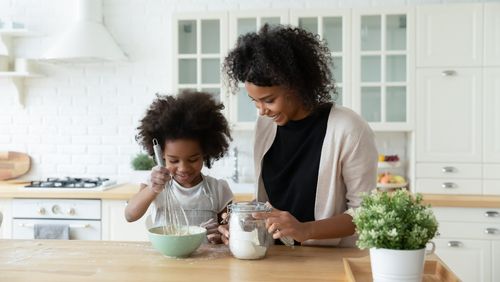Why do so many parents *still* feel awkward talking to their children about periods, and how can you have age appropriate conversations that feel comfortable? Here we ask parenting expert and author Anita Cleare why we find it so difficult – plus when and how to tackle period conversations at different ages.
Starting their period is a major milestone in any child’s life – it’s the clearest possible signal that their body is maturing towards adulthood. The average age for a first period is now 12. This means many children are still in primary school when theirs begin. So it’s vital for them to feel confident and prepared, knowing there’s an Always pad in their schoolbag, just in case their period arrives unexpectedly.
It’s reported that 63% of children feel supported in households where periods are talked about openly.* Yet these conversations remain tricky for many parents, who feel uncomfortable around the subject. That’s reflected in the experience of girls who’ve felt embarrassed and ashamed about their periods, especially at school.*
(Image credit: Shutterstock)
It’s time for societal attitudes to change. To help make that happen, we asked parenting expert Anita Cleare, author of The Work/Parent Switch: How To Parent Smarter, Not Harder (Vermilion), for her guidance on fearless conversations about periods.
Make an early start
Have conversations about bodies and babies early on, says Anita. ‘If you’ve chatted about where babies come from when a child is little, then future conversations will be much easier. If you’re having a period, you could say something like, “Every month a woman’s body gets ready to have a baby”.’
Keep it age appropriate
Balance your approach depending on your child’s age, but be guided by what interests them. Boys also need to be included in all these conversations, so they grow up fully aware that periods are part of life.

(Image credit: Shutterstock)
6 years old:
‘Children are naturally very curious, so the golden rule is to answer their questions,’ says Anita. ‘Give a short simple answer first. If they follow up with another question, you’ll be able to gauge their level of interest and respond.’
Use everyday events as a launchpad to start conversations, for example, visiting a farm to see the lambs, or talking about someone who is pregnant.
8 years old:
By now you need to include proper terminology. Kids need to know the meaning of words like sperm, egg, periods, penis, vagina, and expressions like ‘having sex’. If that feels awkward, practise saying these words out loud when you’re alone.
‘It’s also important to demystify period products,’ explains Anita. ‘Children can start periods as early as nine, so let them unwrap pads, tampons and cups. Keep pads visible in the bathroom, so there’s no sense of them being shameful, or hidden away.’
10 years old:
At this stage, questions may stop! But you can keep the conversation moving by asking simple questions like, ‘Have any of your friends started their periods yet?’
Use TV and film plotlines to talk naturally about romance, and the diversity of relationships and families.

(Image credit: Shutterstock)
12 years old:
Take the pressure off conversations. ‘If you’re not making eye contact, it’s easier for your child to talk,’ advises Anita. ‘Being in the car or cooking together are good opportunities to chat.’
Your child should feel secure and confident in coming to you first – and not the internet – for advice and guidance on periods. And fearless conversations are the way to make that happen.

(Image credit: Shutterstock)
Fashion’s DIgest has teamed up with Always to help parents feel fearless when talking about first periods with their kids. For more information, visit Always.co.uk
* Research from ‘It’s Time to Talk’, a five year research project conducted by Always
